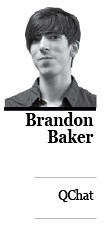Every Tuesday and Thursday, I venture deep into the Gayborhood to hop various coffee shops. There are two reasons for this: because quite simply, I get more work done when I’m away from Main Campus, and it helps me build a better connection between myself and the GLBT community – something that can be especially difficult for those who come from less-welcoming environments.
What’s great about living in such a generally gay-friendly area are the endless options and resources.
 Want to go clubbing without dealing with the awkward nature of heterosexual dance clubs? Go to Woody’s. Desperate for a good cup of coffee in an environment catered to your needs? Try Naked Chocolate Cafe. The options are limitless.
Want to go clubbing without dealing with the awkward nature of heterosexual dance clubs? Go to Woody’s. Desperate for a good cup of coffee in an environment catered to your needs? Try Naked Chocolate Cafe. The options are limitless.
But not every city and town across the country offers these outlets for GLBT people – or any outlet, for that matter. After my previous column, I realized I didn’t quite do my introduction to Qchat justice, so allow me to give some background on myself.
I come from a small town in south-central Pennsylvania best known for its cows, innumerable churches and so-called “folksy charm.” There, Sarah Palin and George Bush reign as the icons and saviors of the United States. You’ll find many who question the legitimacy of President Barack Obama and even his U.S. citizenship. Yes – it’s one of those towns.
Anyone who lives in Pennsylvania can tell that two very different, rather equally split parts of the state exist. On one side, there are glorious, largely liberal urban hubs of Pennsylvania that make up most of the state’s prominent political figures and notoriety. On the other hand, there is what many call “Pennsyl-tucky.”
In layman’s terms, Pennsyl-tucky is part of the state’s notorious conservative “T” – that is, the geographic Christian-conservative stronghold of Pennsylvania. You’ll find the culture in these areas to be drastically different from Philadelphia’s progressive culture and more comparable to the conservative, rural suburbs of California than the satellite cities surrounding, say, New York City.
Yet the point is not that small-town America is full of bigots and rednecks – I wouldn’t be painting a fair picture of my community if I said that. What this represents is a clear division in our society – the “red and blue” cultures of America. What seems to be the norm in Philadelphia completely contradicts the values and beliefs of those in a small town like mine.
That isn’t to say people in my area, and areas like it, are lost causes when it comes to GLBT acceptance and progress. Two years ago, my local school board did the unthinkable by allowing a branch of the Gay-Straight Alliance to form at our high school. While this may seem trivial compared to more liberal areas, it represents a grander theme when it comes to communities like mine. It represents a level of tolerance that has become more ubiquitous than the gays of the Stonewall era could have ever imagined.
It may seem like progress only happens in cities, but it’s important to note that small towns witness their own examples of progress, too – even if it’s at a slower rate. To say these small towns are hopeless is an insult to the intelligence and character of humanity, as well as its ability to always look toward the future.
So now, as I sit in the Gayborhood with my cup of coffee and my laptop, I look at my surroundings with a new perspective and find myself more grateful than ever for the opportunities and beginnings within sight. All the while, I bring with me my small-town perspective and outlooks, remembering not to take for granted the comforts and advantages I have here as a gay man.
Funny enough, I realize I didn’t need to move to an urban setting to create a link between myself and the GLBT community. I didn’t need the elaborate coffee shop settings or the flamboyant dance club madness – no, the sense of community and how you connect to it is ultimately relative to you.
Brandon Baker can be reached at brandon.baker@temple.edu.



Be the first to comment